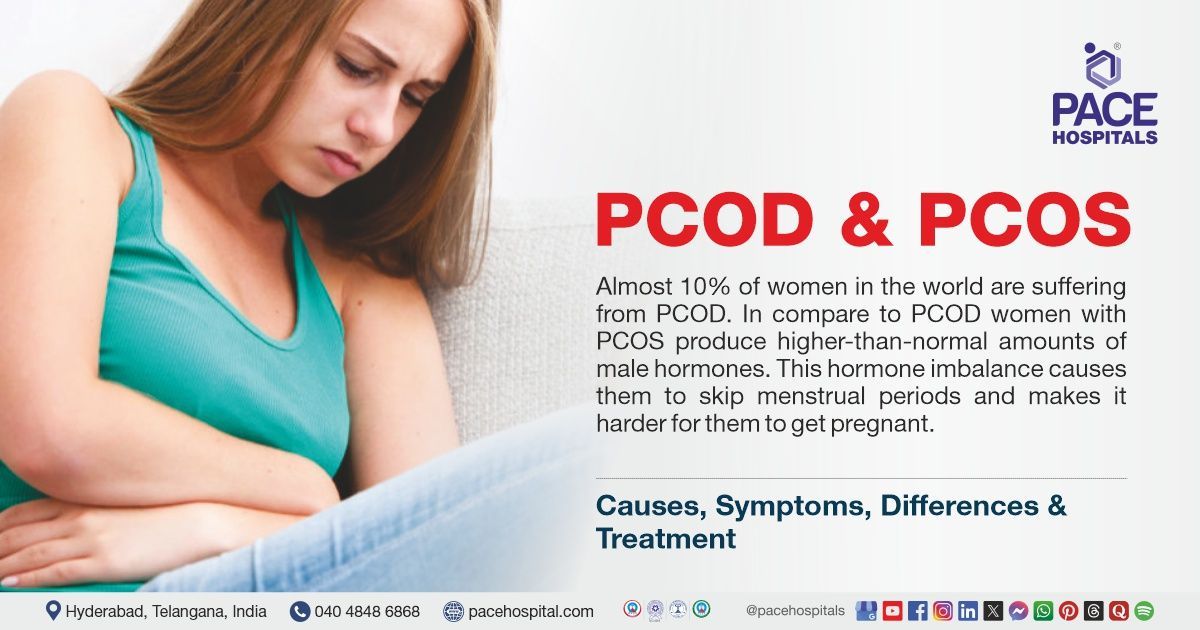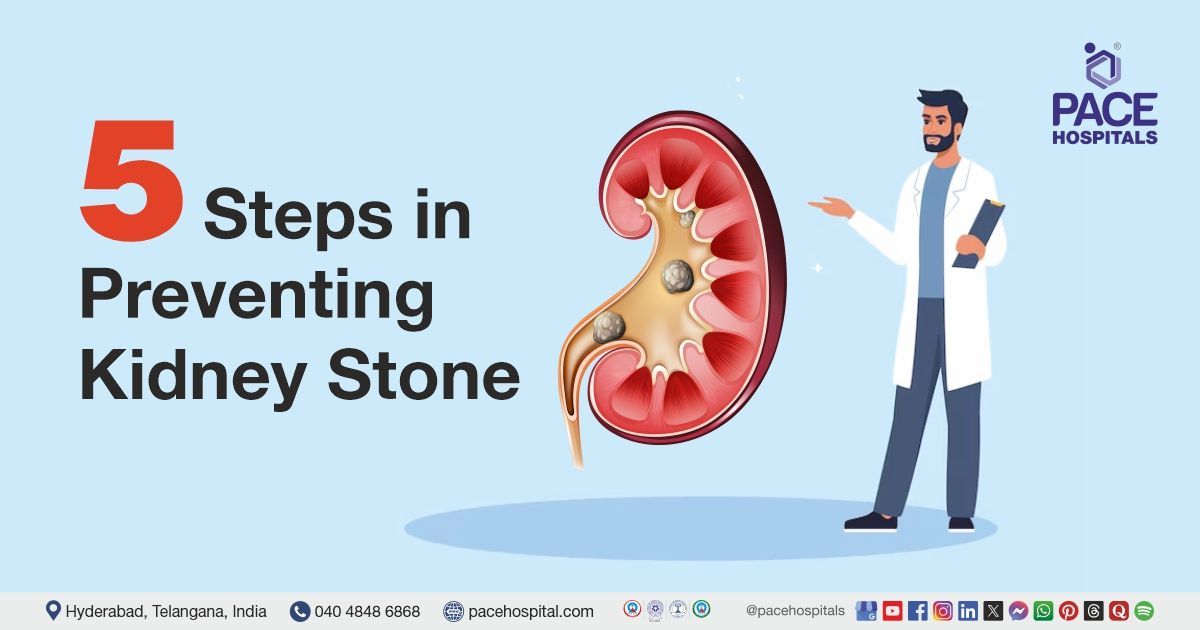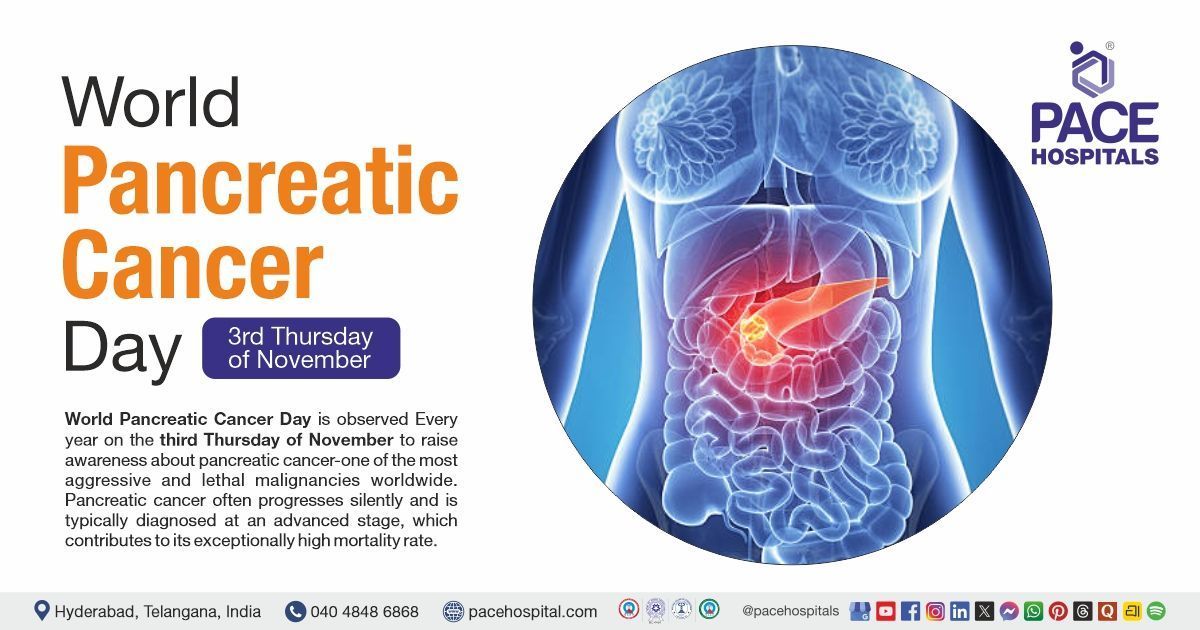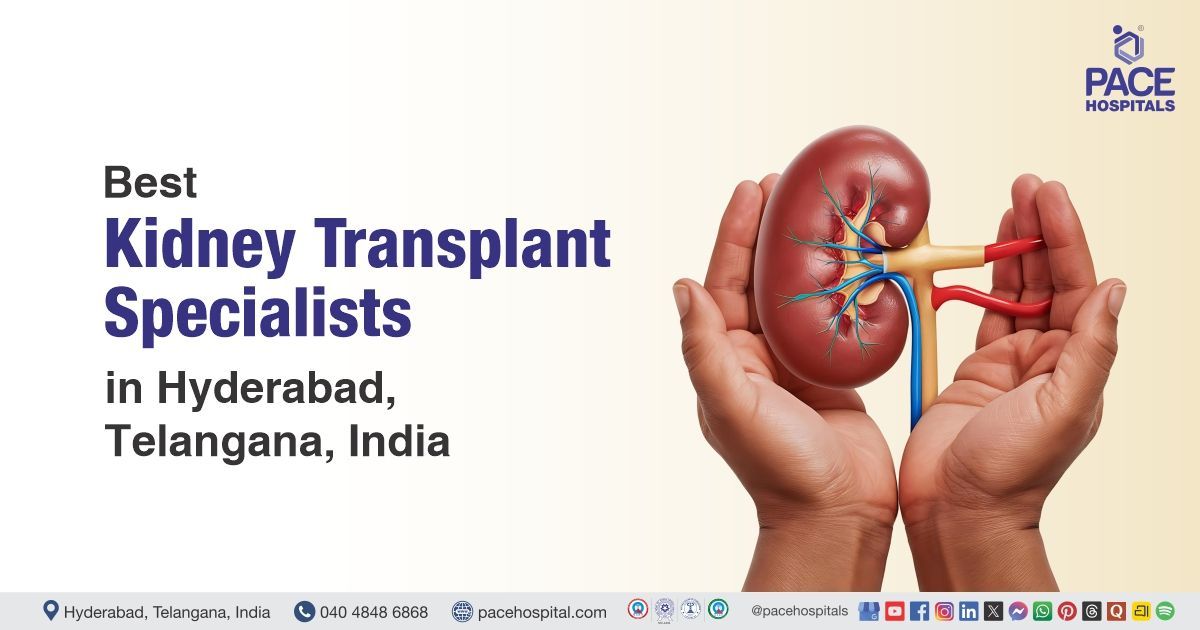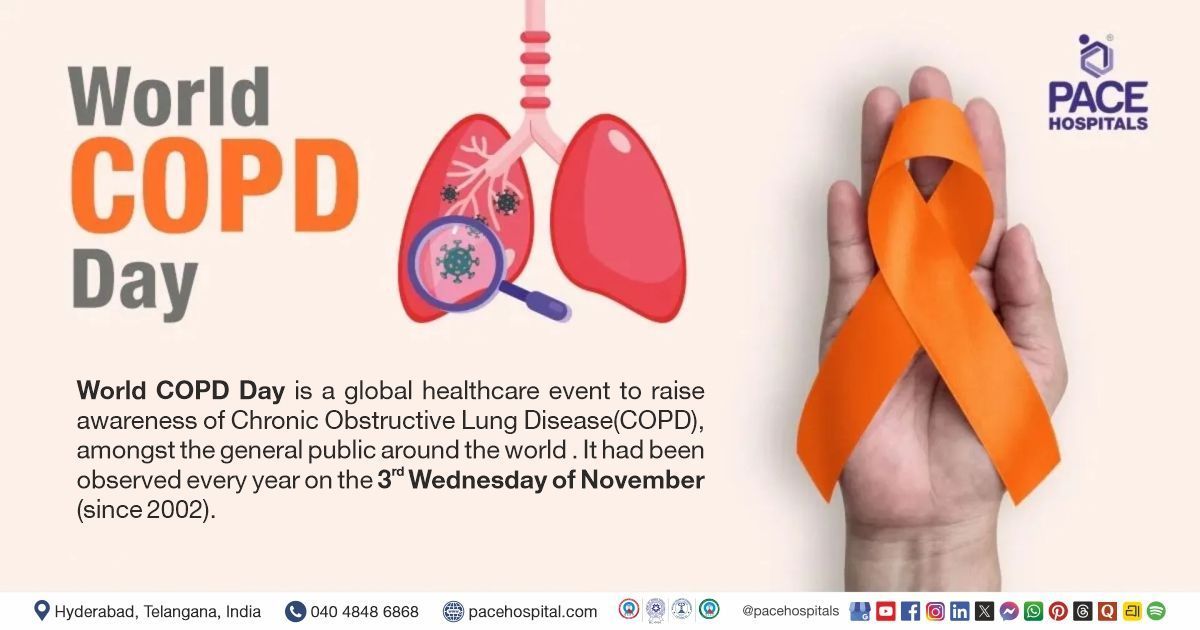PCOD and PCOS: Causes, Symptoms, Differences and Treatment
PACE Hospitals
PCOD and PCOS are two common gynaecological conditions that disturb the hormonal health of women. With so many women getting ultrasound results that show PCOS or PCOD, it's no wonder the question arises: Are these two conditions the same, or is there more to the story?
Understanding the subtle yet important differences can help a woman to take control of her health with confidence.
PCOD or PCOS is a condition that affects women’s ovaries, the reproductive organs that produce progesterone and estrogen hormones that help in regulating the menstrual cycle and also produce a small amount of hormones inhibin, relaxin, and male hormones called androgens.
Almost 10% of women in the world are suffering from PCOD. In compare to PCOD women with PCOS produce higher-than-normal amounts of male hormones. This hormone imbalance causes them to skip menstrual periods and makes it harder for them to get pregnant.
Besides unpredictable hormonal behavior, this condition can trigger
- Diabetes
- Infertility
- Acne
- Excessive hair growth
It's a fairly common disorder, but one with no exact cure.
What is PCOD Problem?
PCOD full form in medical - Polycystic Ovarian Disease
PCOD (Polycystic Ovarian Disease) is a medical condition in which the woman ovaries produce immature or partially mature eggs in large numbers and over the time these become cysts in the ovaries. Due to these ovaries become large and secrete large amount of male hormones (androgens) causing infertility, irregular menstrual cycles, hair loss and abnormal weight gain. PCOD (Polycystic Ovarian Disease) can be controlled by diet and lifestyle modifications.
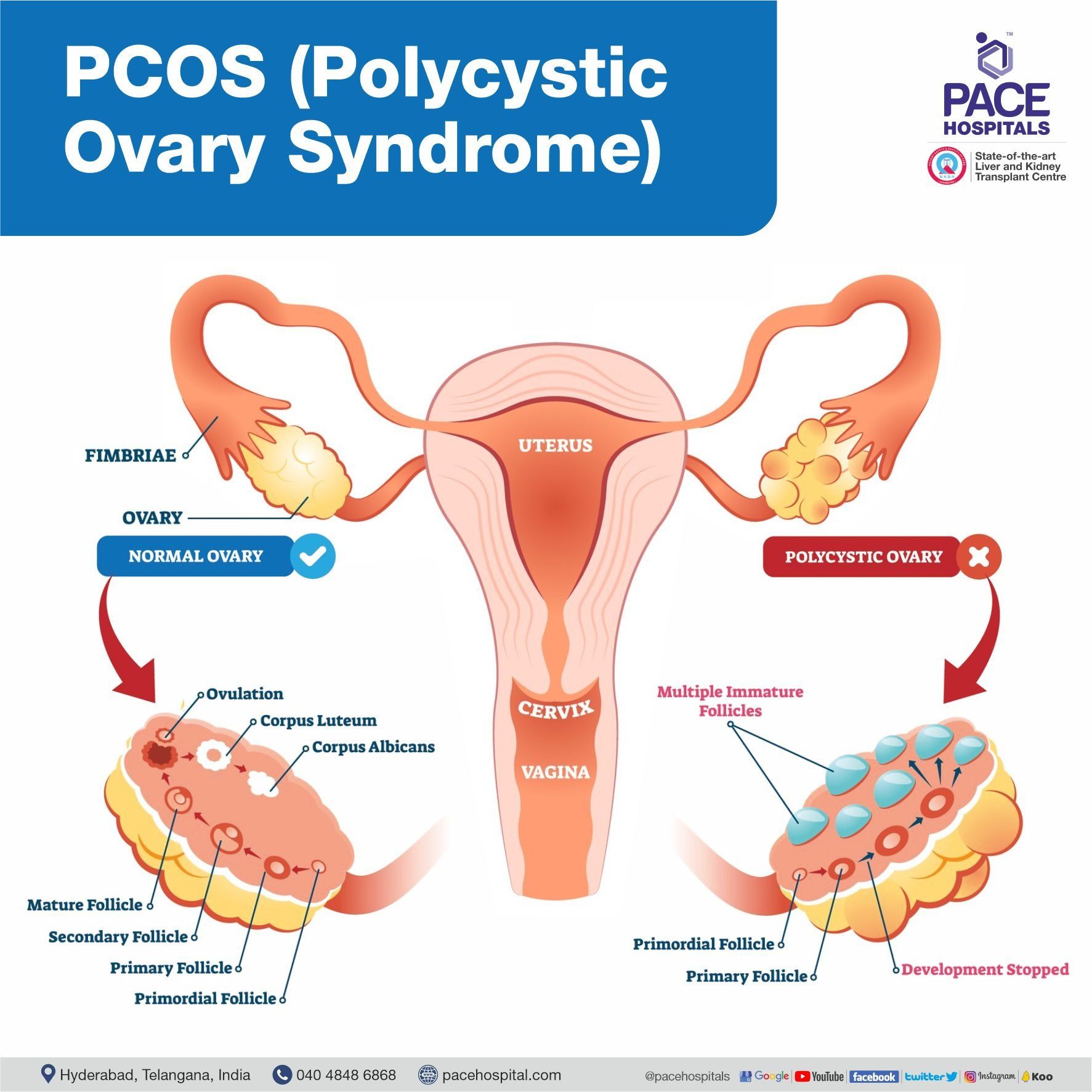
What is PCOS?
PCOS full form in medical - Polycystic Ovary Syndrome
PCOS (Polycystic Ovary Syndrome) is a metabolic disorder in which the woman affected by hormonal imbalance in their reproductive years (between ages 12 and 51). Due to increase level of male hormones females might skip menstrual periods, have irregular ovulation making it hard to get pregnant, get abnormal hair growth on the body and face simultaneously it can lead to heart disease and diabetes in long term. PCOS is a serious medical condition, and it requires proper medical attention or surgical treatment.
Many women have PCOD / PCOS but they don’t know it. Group of symptoms that affects the ovulation and ovaries are:
- Ovarian cysts
- Increased levels of male hormones
- Skipped or irregular periods
PCOS prevalence in India
Only a few researchers took a part and studied the prevalence of Polycystic ovary syndrome (PCOS) in different regions of India. From the very limited data, PCOS prevalence in India ranges from 3.7% to 22.5%. Due to very limited data and different regions, it is very difficult to define prevalence of PCOS in India.
Around 5% to 18% of women worldwide are affected by polycystic ovary syndrome (PCOS), and as many as 70% of them remain undiagnosed. Understanding that a woman has PCOS or PCOD is crucial to manage the condition effectively and to avoid fertility issues down the line.
What are the common signs and symptoms of PCOD problem / PCOS (Polycystic Ovary Syndrome)?
Some females start seeing symptoms around the time of their first period, some women only discover when they have gained a lot of weight or trouble getting pregnant. The most common signs and symptoms of PCOD Problem or PCOS in females are:
- Irregular menstruation (Oligomenorrhea)
- Skipped or absence of menstruation (Amenorrhea)
- Heavy menstrual bleeding (Menorrhagia)
- Excessive Hair growth (face, body - including on back, belly, and chest)
- Acne (face, chest, and upper back)
- Weight gain
- Hair loss (hair on the scalp gets thinner and fall out)
- Skin darkening (Neck, in the groin, and under the breasts)
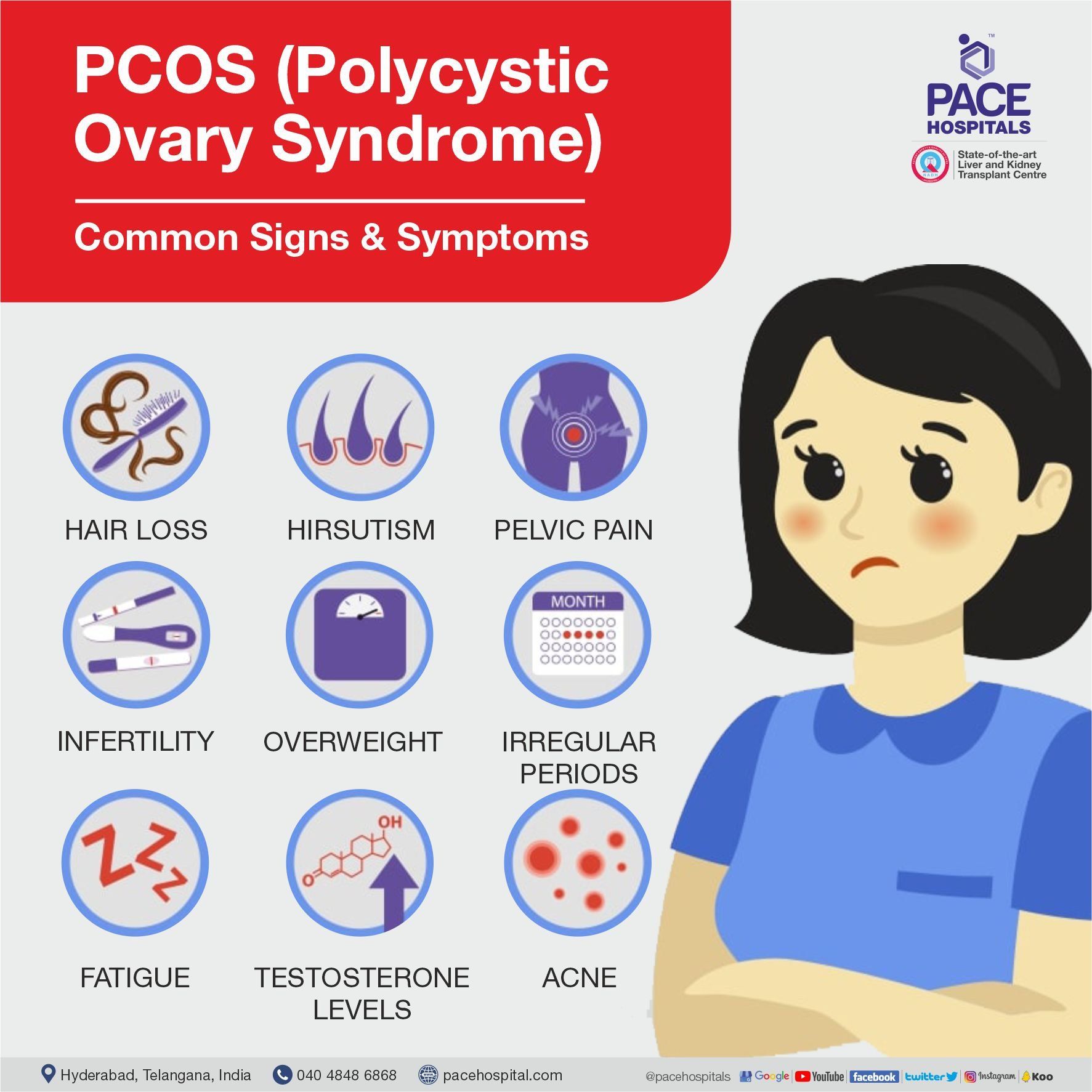
Causes of PCOS (Polycystic Ovary Syndrome)
Exactly how women get affected by PCOS is not known, however these are some significant factors:
- Excess insulin production: excess insulin levels in body might increase androgen production (a male hormone which is very less in female) that causes difficulty with ovulation
- Excess androgen production: The ovaries produce abnormally excess androgen hormones that can lead to acne and hirsutism (hair growth on the face and body)
- Low-grade inflammation: As per the recent study, female with PCOS are having low-grade inflammation that causes increased level of androgen production which can lead to blood vessels or heart problem.
- Heredity: Women with PCOS show certain genetics correlation
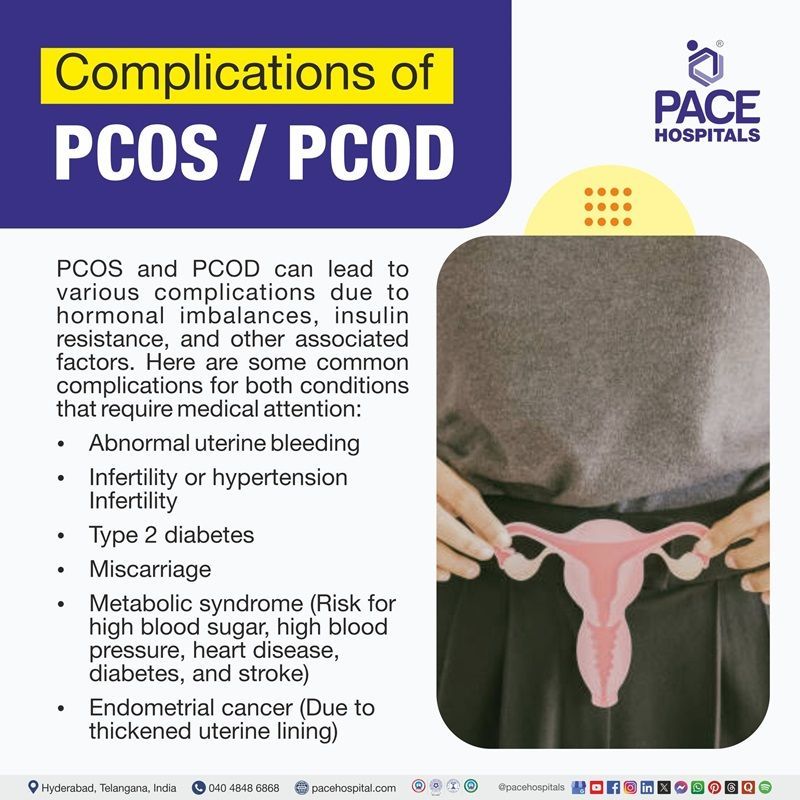
Complications of PCOS / PCOD problem
Every woman will think what happen to their body when they have PCOD or PCOS. Having higher-than-normal androgen levels can affect your health. These are the complications of PCOS or PCOD problem that require medical attention:
- Abnormal uterine bleeding
- Infertility or hypertension Infertility
- Type 2 diabetes
- Preterm labor and premature birth
- Metabolic syndrome (risk for high blood sugar, high blood pressure, heart disease, diabetes, and stroke)
- NASH (Non-alcoholic steatohepatitis)
- Depression (Many women end up experiencing depression and anxiety due to unwanted hair growth and other symptoms)
- Sleep apnea (More common in women who are overweight, causes repeated pauses in breathing during the night, which interrupt sleep)
- Endometrial cancer (Due to thickened uterine lining)
- Miscarriage (spontaneous loss of a pregnancy)
PCOS / PCOD problem in future
Females those who are diagnosed with PCOD problem or PCOS should monitor their health on regular basis to avoid any complications in the future. If left untreated, PCOD problem in future can lead to type 2 diabetes, obesity and other mental issues due to hormonal imbalance whereas PCOS in future can have serious complications such as risk of hypertension, hyperglycaemia, endometrial cancer and pregnancy complications (premature birth / preeclampsia / misscarriage).
PCOD vs PCOS
Some females might be confused whether PCOD and PCOS are the same or different from each other. Both the medical conditions are associated with ovaries and hormonal imbalance in women during their reproductive age (between 12 and 51 years) and depicts the same symptoms. Here are differences between PCOD and PCOS every female should know:
| PCOD (Polycystic Ovarian Disease) | PCOS (Polycystic Ovary Syndrome) |
|---|---|
| PCOD is a common disorder, 10% of world women population affected by it. | PCOS is a serious medical condition around 0.2% to 2.5% of world women population affected by it. |
| PCOD is a condition in which ovaries produce many immature or partially mature eggs, this happen due to poor lifestyle, obesity, stress and hormonal imbalance. | PCOS is a metabolic disorder and more severe form of PCOD can lead to anovulation where ovaries stop releasing eggs. |
| PCOD doesn’t affect fertility in women, in this condition woman still can ovulate and become pregnant with little help, following medication can complete pregnancy. | PCOS seriously affects fertility in women. Due to PCOS woman cannot ovulate regularly, making them hard to get pregnant. If become pregnant, there is a risk of miscarriage, premature birth or complications in their pregnancy. |
| PCOD doesn’t have any serious complications. | PCOS have serious complications such as type 2 diabetes, heart disease, high-blood pressure and endometrial cancer in later stage. |
In both the conditions - PCOD (Polycystic Ovarian Disease) and PCOS (Polycystic Ovary Syndrome), weight-loss, a healthy diet, avoiding junk foods, processed foods, regular exercise have shown effective results. Early diagnosis of the disease will help is treating the conditions. If having skipped or irregular periods, acne, hair growth on back or face consult gynaecologist and get yourself checked.
PCOS and PCOD difference - PPT | Watch Video
Diagnosis of PCOD (Polycystic Ovarian Disease) / PCOS (Polycystic Ovary Syndrome)
PCOD or PCOS has physical findings that affect body systems and can be diagnosed through blood test and imaging. Depending on symptoms such as irregular periods, unwanted male-pattern hair growth on a woman's chest, face, and back, acne, or thinning of scalp hair, the gynaecologist will ask about medical history, eating and drinking habits, taking any prescription or over-the-counter medications, including vitamins and supplements.
To diagnose PCOD or PCOS, a gynaecologist may recommend:
- Pelvic examination: Physically checking the reproductive organs for masses, abnormalities, or any growth
- Blood tests: Blood tests will help to understand the hormone levels, these incudes fasting lipid profile (to check the levels of total cholesterol, high-density lipoprotein (HDL), triglycerides levels, low-density lipoprotein (LDL)), glucose tolerance tests.
- Imaging test: Ultrasound imaging test to check the size of ovaries, the lining of uterus and cysts in ovaries
Apart from the above, the gynaecologist might recommend additional tests to check for complications. These may include:
- Periodical monitoring of blood pressure, glucose tolerance, cholesterol and triglyceride levels
- Screening for anxiety and depression
- Screening for obstructive sleep apnea (OSA)
Lifestyle modification and home remedies for PCOD (Polycystic Ovarian Disease) / PCOS (Polycystic Ovary Syndrome)
PCOD / PCOS mainly affects the body’s hormone balance in female. Following steps will help in females to decrease androgen level in the body:
- Maintaining healthy body weight: BMI (body mass index) ranges from 18.5–24.9 considered as ideal and healthy for females, above than 30 considered as obese and not healthy. Maintaining healthy body weight or weight loss help in improving overall body cholesterol levels, reduce the risk of high blood pressure, heart disease, diabetes, maintaining ideal insulin levels and androgen levels that also restore ovulation phase in the menstrual cycle. Consult a dietitian for weight-loss pragramme to reach within a healthy BMI.
- Limiting carbohydrate's consumption: If you have PCOD (Polycystic Ovarian Disease) or PCOS (Polycystic Ovary Syndrome), follow a low-carb diet or complex carbohydrates diet that help in maintaining insulin levels. Eat fish, meat, eggs, vegetables that grow above ground and natural fats (like sunflower seeds, pumpkin seeds, sesame seeds and butter) and avoid sugar and starchy foods (like potatoes, bread, rice, pasta, and beans)
- Do regular exercise and be active: If you have PCOD (Polycystic Ovarian Disease) or PCOS (Polycystic Ovary Syndrome), doing regular exercise and becoming active will help in regulating blood sugar levels and keep your weight under control.
Frequently Asked Questions (FAQs) on PCOS and PCOD
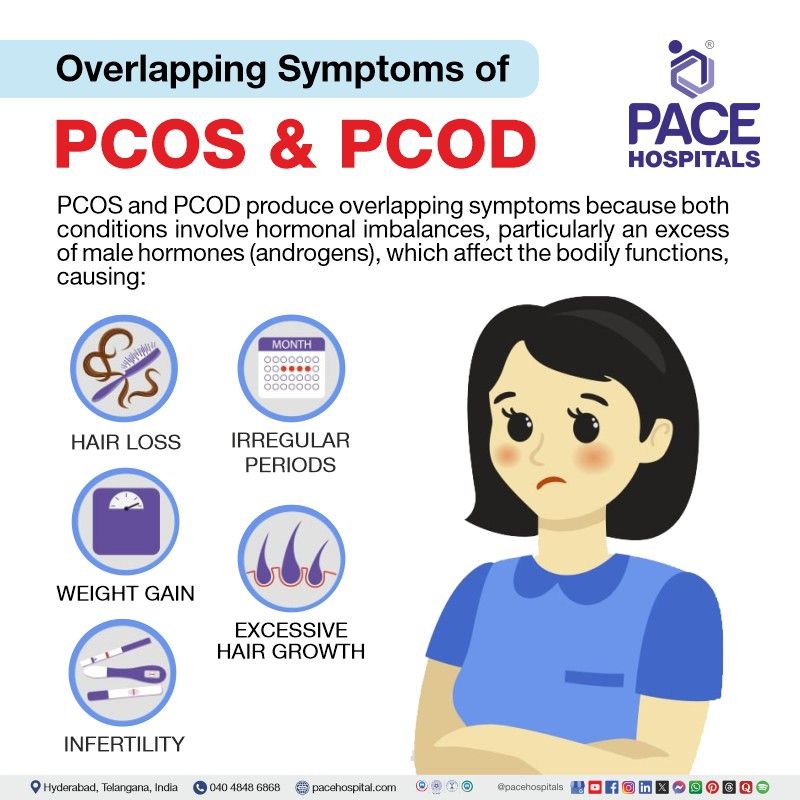
What is the best possible treatment for PCOD Problem / PCOS (Polycystic Ovary Syndrome)?
PCOD / PCOS treatment focuses on managing your individual problems, such as irregular periods, obesity, infertility, acne, or hirsutism. Treatment usually starts with lifestyle changes like weight loss, diet, and exercise. Losing just 5 to 10 percent of your body weight can help regulate your menstrual cycle.
Treatment will depend on the symptoms like hair growth, acne and metabolic disorders. This includes:
- Regulate the menstrual cycle by medication to treat hormonal imbalance and insulin resistance
- Ovulation induction (the quality and quantity of the ovulation) through oral medicines and injections
- Infertility treatment through fertility drugs
- Lowering excessive hair growth
- Skin treatments for acne and pigmentation
- A laparoscopic procedure - ovarian drilling to destroy androgen-producing tissue in the ovaries, in case of PCOS patients not responded to hormonal treatment
Any diet that helps you lose weight can help your condition. However, some diets may have advantages over others. Weight loss can also improve cholesterol levels, lower insulin, and reduce heart disease and diabetes risks.
20 minutes of moderate-intensity exercise at least five days a week can help women to lose weight. Losing weight with exercise also improves ovulation and insulin levels.
The best treatment for PCOD (Polycystic Ovarian Disease) and PCOS (Polycystic Ovary Syndrome) will consist of on-time diagnosis and the appropriate treatment modalities can help to overcome the symptoms. Maintaining healthy lifestyle is equally important to treat hormonal imbalance and conditions related.
Kindly consult if skipped periods, or you have other PCOD / PCOS symptoms like hair growth on your face or body / if you’ve been trying to get pregnant for 12 months or more without success.
How to cure PCOD problem permanently?
PCOD is not a serious problem, but there is no complete cure. Maintaining healthy weight, following complex carbohydrate diet, doing regular exercise and being active will be helpful in controlling PCOD problem and its underlying symptoms. Consulting periodically with gynaecologist and primary care doctor is also advisable for females to have healthy life in the future.
Can women get pregnant when she has PCOD (Polycystic Ovarian Disease)?
Yes, women with PCOD (Polycystic Ovarian Disease) can get pregnant and complete pregnancy, this requires planning and follow-up consultation with gynaecologist to avoid any future complications.
Can you have weight gain in PCOD (Polycystic Ovarian Disease) / PCOS (Polycystic Ovary Syndrome)?
Yes, women can gain weight in PCOD problem or PCOS (Polycystic Ovary Syndrome) due to metabolism, hormonal imbalance and increased level of androgen male hormone. Weight gain pattern in women will also be like male, develop belly fat in a higher percentage of body fat.
How to cure PCOS (Polycystic Ovary Syndrome) permanently?
PCOS (Polycystic ovary syndrome) is a serious medical condition in females, and it can't be cured completely, but the associated one or many symptoms can be managed to give quality life.
If a female diagnosed with PCOS, she should regularly monitor blood pressure, check the blood sugar levels in case of type 2 diabetes, check the cholesterol levels and other possible associated complications.
Planning regular visit with primary care doctor or gynaecologist will also be advised to manage the PCOS symptoms. In this case, doctor may advise these PCOS treatment modalities based on the symptoms:
- Lifestyle changes and die modifications to reduce weight in case of weight-gain, to maintain insulin and cholesterol levels.
- Medications to treat skipped or irregular period, cholesterol levels, fertility problem, acne, pigmentation, abnormal hair growth (on the face or body), thinning of hair or hair loss, managing insulin levels, blood pressure.
- Laparoscopic ovarian drilling surgery to lower down the testosterone hormone levels.
Can females have PCOD problem after marriage?
Post marriage, PCOD (Polycystic Ovarian Disease) can trigger in women due to stress and lifestyle changes. In case of irregular periods consult gynaecologist to know the exact reason behind it, generally it is advised to loss weight if there is a weight gain post marriage, follow proper healthy diet and lifestyle to avoid PCOD problem after marriage. If having irregular periods and planning a child, then consult your doctor for treatment and advice to avoid any complications in near future during pregnancy.
Does PCOD occur in women who are sexually active?
PCOD (Polycystic Ovarian Disease) problem can occur in any women, whether they are sexually active or not. This happens in females due to stress, poor lifestyle, and hormonal imbalance. Controlled diet and losing weight can help in regularizing irregular periods caused by PCOD. Consult gynaecologist to have correct and timely treatment to regularize your healthy lifestyle.
What to expect from a doctor when going for appointment?
You should consult 1st with gynaecologist (expert in female reproductive system) along with endocrinologist for hormonal imbalance or infertility specialist if planning pregnancy. During doctor consultation, doctor might ask these questions. Providing detailed information will help in getting the best treatment for PCOS (Polycystic Ovary Syndrome) or PCOD (Polycystic Ovarian Disease).
- What are your signs and symptoms?
- How often are you having the symptoms?
- How severe are your symptoms?
- From when have you started noticing symptoms?
- Since how long you are having symptoms?
- When was your last date of menstrual cycle?
- Have you gained weight since you first started having periods?
- Did you gain weight?
- Are you planning for pregnancy?
- Has your sister or mother ever been diagnosed with PCOS?
Share on
Request an appointment
Fill in the appointment form or call us instantly to book a confirmed appointment with our super specialist at 04048486868

